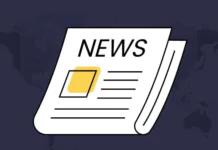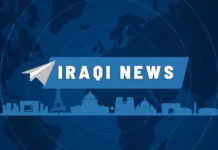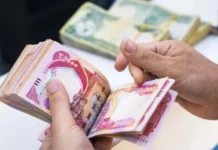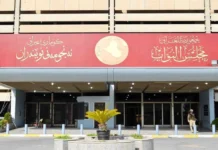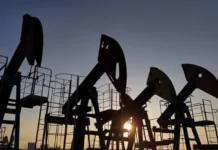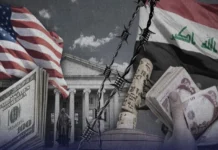The Yellow Metal Is On Track For Its Best Weekly Performance In More Than A Month
Money and Business Economy News – Baghdad Gold is poised for its best weekly performance in over a month on Friday, as a weaker dollar and growing concerns about the fiscal position of the world’s largest economy boosted safe-haven demand.
Spot gold rose 0.2 percent to $3,299.79 per ounce by 0014 GMT. The precious metal has risen about 3 percent so far this week and is on track for its best weekly performance since early April.
US gold futures also rose 0.2 percent to $3,299.60.
The dollar has fallen more than 1 percent so far this week and is on track for its worst weekly performance since April 7, making gold priced in the greenback cheaper for holders of other currencies.
The Republican-controlled U.S. House of Representatives approved a comprehensive tax and spending bill on Thursday, ensuring implementation of most of President Donald Trump’s agenda and adding trillions of dollars to the government debt.
The bill now moves to the Senate, which is controlled by Republicans by a margin of 53 to 47 seats.
Gold is often viewed as a safe haven during times of political and financial uncertainty.
Meanwhile, Iranian Foreign Minister Abbas Araghchi warned that the United States would bear legal responsibility for any Israeli attack on Iranian nuclear facilities, following a CNN report that Israel was preparing to launch strikes on Iran.
As for other precious metals, spot silver was steady at $33.07 per ounce, platinum rose 0.1 percent to $1,082.47, and palladium fell 0.3 percent to $1,012.00. https://economy-news.net/content.php?id=55744
The Relationship Between The State And The Economy And The Problem Of Transitioning From The Traditional To The Organized
Dr. Haitham Hamid Mutlaq Al-Mansour At the heart of every country is a vibrant economy that regulates the rhythm of its life, and Iraq is no exception.
The modern state is no longer merely a political entity that maintains security and public order; it has transformed into a major player in shaping the economy and achieving its balance and stability.
Unfortunately, this relationship takes on more complex dimensions, with the economy sometimes becoming an arena for political conflict and at other times a tool for domination and control. Since the founding of the Iraqi state, the economy has remained hostage to political fluctuations, beginning with the industrialization phase in the mid-twentieth century, through the economic blockade of the 1990s, and finally reaching the post-2003 period, which witnessed a radical transformation in the structure of both the economy and politics.
The state, which is supposed to be the guardian of economic balance and resource allocation, has become a cause for weakening the market and deepening imbalances.
The dominance of government fiscal policy in the economic arena and the marginalization of productive sectors in favor of a rentier economy, in which oil revenues contribute 95% of the gross domestic product, is a cause for concern regarding macroeconomic policy and the relationship between the state and the economy, and what it should be.
Therefore, Iraq’s contemporary history cannot be read in isolation from the intertwining of the economy and power structures. These two sides of the same coin were shaped by both strength and weakness.
The state, which is supposed to be a framework for regulating economic life, has, in the Iraqi case, become a competitor to it and a restrictor of its activity. It controls its components and directs its course beyond the limits of revenue and cost, and in most cases, beyond the conditions of the economy.
Perhaps this “satisfactory” relationship is not a final destiny, but rather a milestone in a long journey in search of an economic identity freed from the sway of politics without being detached from it.
In other countries, not far from us, the state has succeeded in serving as a tool for achieving social and economic justice through fair tax policies, smart investments in infrastructure, and empowering the private sector without relinquishing its oversight role.
However, in Iraq, we are witnessing the absence of a clear economic vision that transforms the state from an incubator of development into a factor hindering it. Bureaucracy is bloated and favoritism is rampant, while basic services decline and job opportunities shrink.
Under the prevailing rentier pattern of government sector employment, this economic model has produced a consumer culture worthy of study. Citizens have been transformed from producers into recipients of oil rents through public employment or government support.
This has led to a profound distortion in the relationship between the individual and the state. The state no longer represents a regulatory authority, but rather has become a “provider” expected to distribute provisions. Thus, society has been robbed of its productive capacity, while the economy has been robbed of its competitive vitality.
There is no escape from a vision framed around transforming the state’s role from that of a “merchant” distributing oil revenues to that of an “engineer” building a diversified economy.
If we work to develop progressive socioeconomic programs aimed at changing the individual’s stereotype from a recipient of financial aid to an actor in production and export processes, this vicious cycle can be broken. Global experience proves that countries that succeed in combining a fair market with social security are the most stable and prosperous.
With its structural imbalances still present, the Iraqi economy is now at a crossroads: Either the state continues its traditional role as a controller and unfair distributor of wealth, which threatens to perpetuate crises, or it transforms into an economic regulator and protector of the interests of the majority by regulating and creating the basic conditions for market growth, production, and diversification, which is the only path to achieving stability and prosperity.
The question remains: Is the political will capable of waging this fateful battle? I expect that history alone will answer. https://economy-news.net/content.php?id=55748
Oil Is Heading For Its First Weekly Loss Since Last April
economy | 09:34 – 05/23/2025 Mawazine News – Follow-up:
Oil prices fell today for the fourth consecutive session and are heading towards their first weekly decline in three weeks, affected by supply pressures and a possible increase in OPEC+ production next July.
US West Texas Intermediate (WTI) crude futures for July were trading at $60.83 per barrel, a decrease of 0.60% from the previous settlement price.
Brent crude futures for the same month were trading at $64.09 per barrel, a decrease of 0.54% from the previous closing price.
Over the course of the week, Brent crude fell by 1.9%, and US crude fell by 2.5%, following two weeks of gains. https://www.mawazin.net/Details.aspx?jimare=261825-=0
Government Advisor: Small Loans Are An Opportunity To Eliminate Unemployment And Achieve Development
Economy | 12:06 – 05/23/2025 Mawazine News – Baghdad – Advisor to the Prime Minister, Mazhar Mohammed Salih, explained on Friday that providing small loans is a pillar of the financial inclusion policy and one of its goals in eliminating unemployment and achieving development and income equality as much as possible,
as it will provide employment opportunities of no less than 60%, while pointing out that loans expand the activity of small enterprises and increase their contribution to the country’s gross domestic product.
Advisor to the Prime Minister, Mazhar Mohammed Salih, said that “within the framework of administrative reform and combating bureaucracy, which are principles of the government’s approach, the factor of simplifying procedures is the first priority in maximizing the management of resources and economic activity to achieve promising sustainable development in accordance with the development goals in our country.”
He added that “Prime Minister Mohammed Shia Al-Sudani’s directive to simplify the granting of small loans undoubtedly carries important benefits at the individual and economic levels, as many small loan programs target marginalized or emerging groups, such as women and housewives, which contributes to their integration into the economy.”
Saleh explained that “these loans are very active financial levers for employment and mobilizing labor market actors, as they facilitate the youth and those with crafts and skills to start their own projects, and open the door to entrepreneurship,” noting that they “help generate a stable source of income for the individual and his family, and reduce poverty and unemployment rates by economically empowering individuals, hence these small loans.”
He explained that “loans play an important role in employment policy and affect the balance of the labor market, by absorbing and providing employment opportunities of no less than 60% of available job opportunities, not to mention their role in raising growth rates in the gross domestic product,” noting that “they play a role in expanding the activity of small projects, which increases their contribution to the country’s GDP.” https://www.mawazin.net/Details.aspx?jimare=261830
For current and reliable Iraqi news please visit: https://www.bondladyscorner.com/
